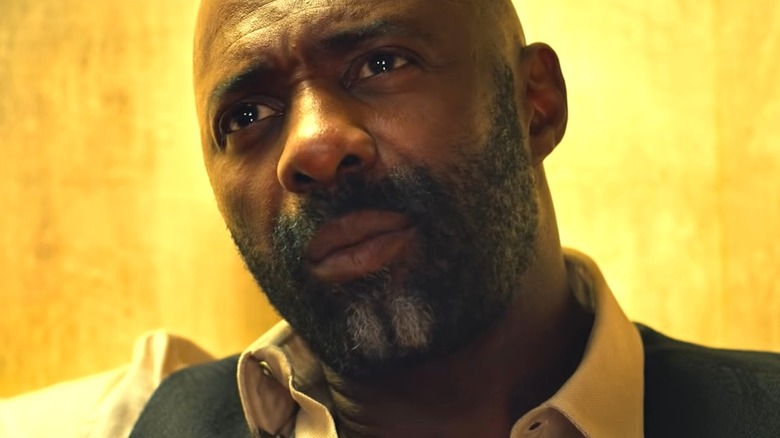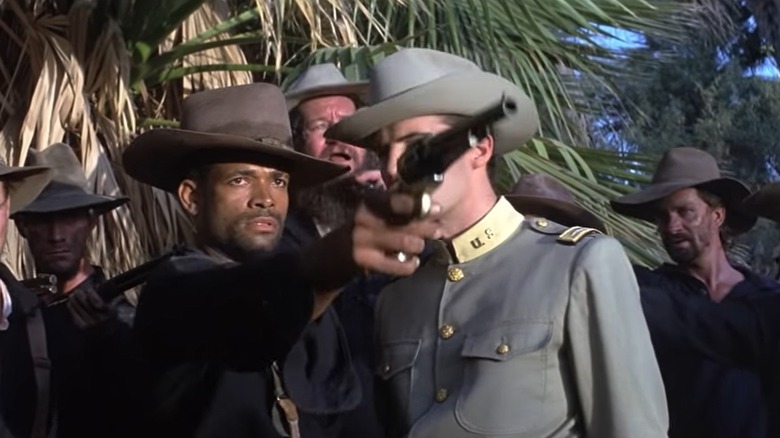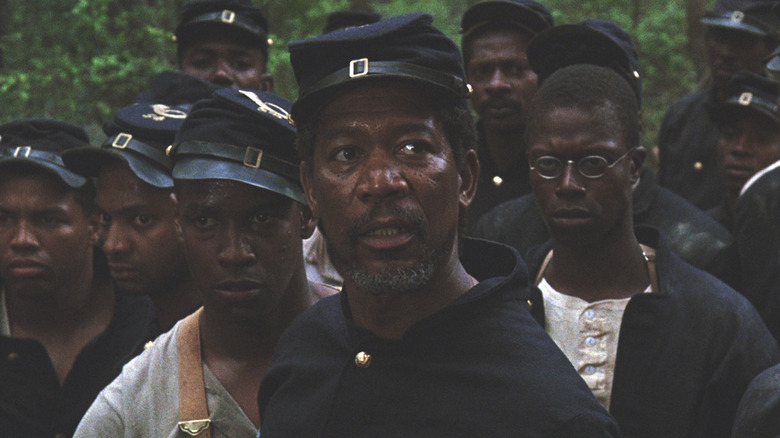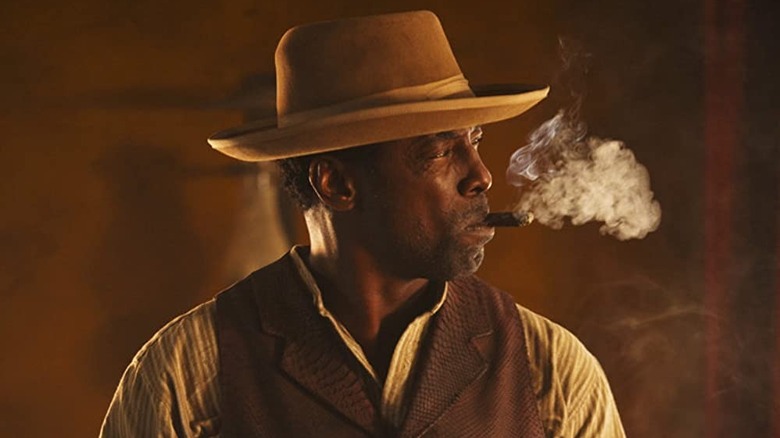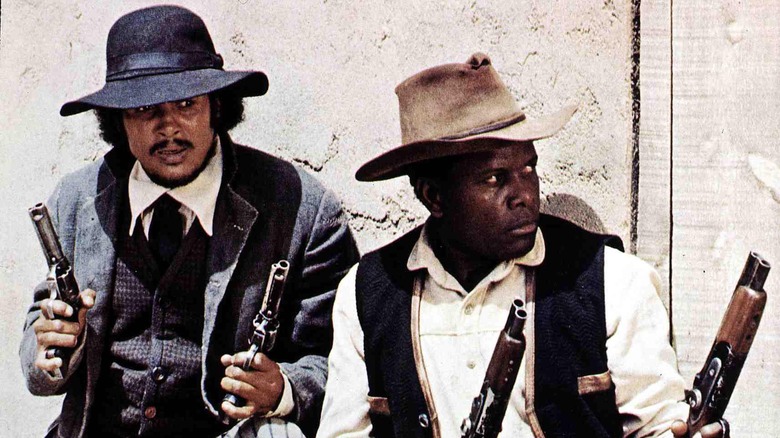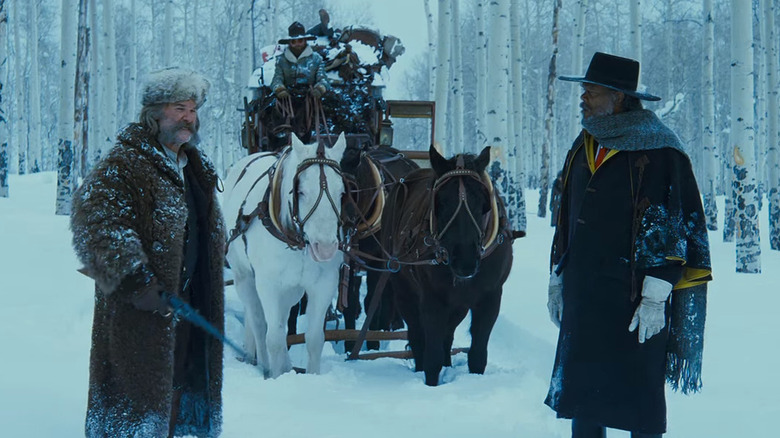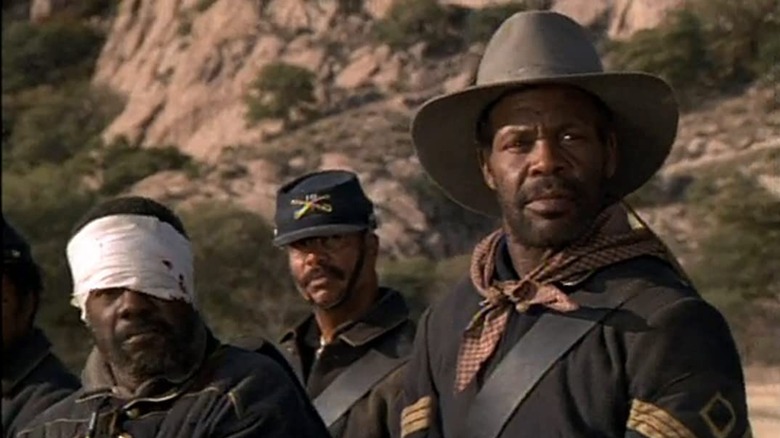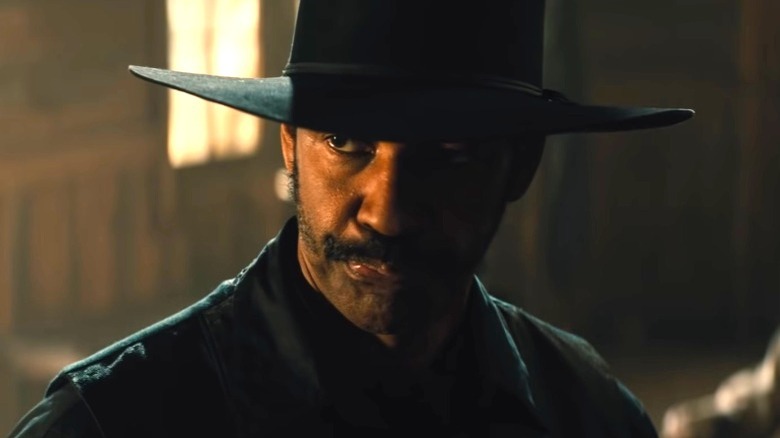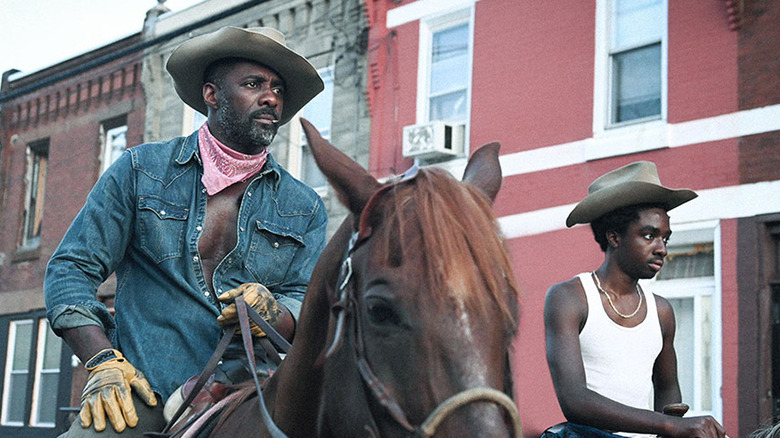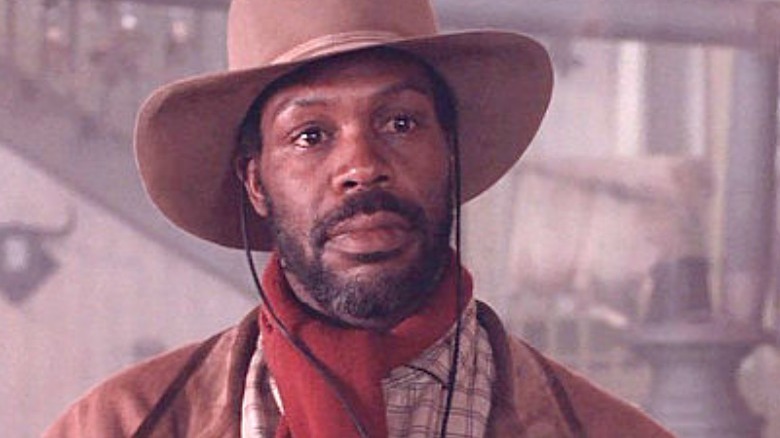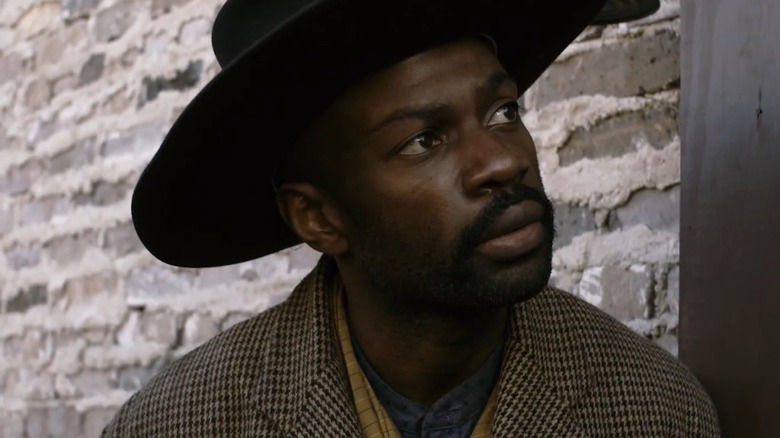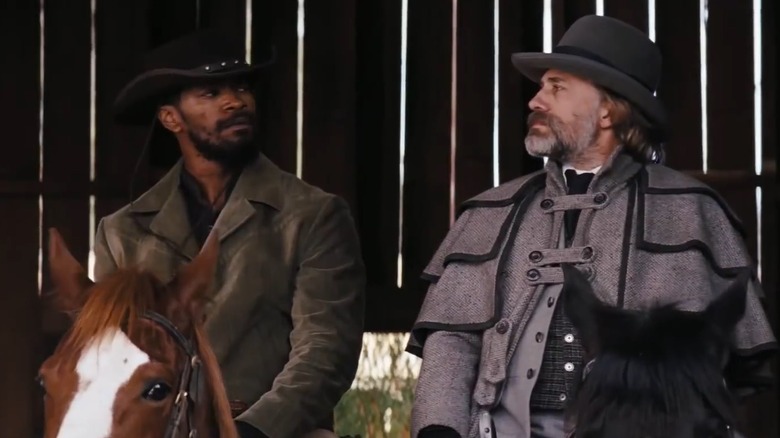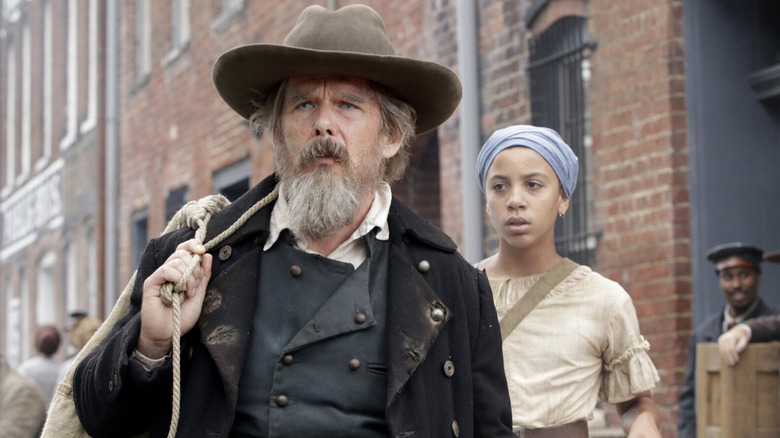Movies Like The Harder They Fall That Western Movie Fans Need To See
The Netflix Western "The Harder They Fall" is taking audiences by storm. The film is impressing audiences not just because it makes a powerful racial statement, but because it's a stylishly made film with a lineup of compelling characters which utilizes its all-Black cast with a "matter-of-factness" that critics like The New York Times have admired.
As observed by The Atlantic, it's been all too common for Hollywood to whitewash the Wild West, but Black cowboys were a part of history, even if you rarely saw them riding alongside John Wayne or Clint Eastwood. While there are some little-seen Westerns such as underrated classics like "Two Gun Man From Harlem" and "Take a Hard Ride" that hint at the presence of Black cowboys, it has not been often that a big studio releases a movie like "The Harder They Fall."
Jeymes Samuel, writer and director of "The Harder They Fall," spoke about the history of Black Westerns with The New York Times, saying succinctly, "we have been ignored from the history of the Old West and the cinematic presentation of what the Old West was." If you dig deep enough, however, there are a few gems to be found. Anyone looking for films that don't completely ignore the history of African American cowboys should keep scrolling for this list of Westerns that you need to see.
Posse
The early '90s saw a flurry of period Westerns such as "Dances With Wolves," "Tombstone," and the "Young Guns" series. In 1993 we got "Posse," a raucous cowboy adventure starring and directed by Mario Van Peebles and featuring a mostly Black cast that includes Tone Lōc, Tiny Lister, Reginald VelJohnson, Big Daddy Kane, Isaac Hayes, and Blair Underwood.
The story opens in Cuba during the middle of the Spanish-American War. Viewers meet Jesse Lee (Van Peebles), leader of an African American unit that's being used as cannon fodder against the Spanish army. Their sadistic white commander forces them to keep fighting, but a small contingent of the Buffalo Soldiers desert the front lines after an attack on a Spanish gold shipment, taking their spoils with them out of Cuba.
However, the army is in hot pursuit of the renegade soldiers. From New Orleans, the outlaws must make their way across the frontier to Freemanville, where Jesse hopes to find revenge for his father's death at the hands of the Klu Klux Klan and free the town from the clutches of a vicious tycoon. "Posse" never quite reaches the heights of "The Harder They Fall," but it's a slick and stylish film that aims high. Even if it doesn't always hit the mark, it fires a fast, fun, and wild adventure that manages to touch on serious issues.
Glory
The 1989 film "Glory" is a fictionalized account of the Civil War's first African American regiment based on letters written by the unit's white commander, Robert Gould Shaw. Hailing from a family of prominent Boston abolitionists, Shaw is promoted to Colonel to take charge of the 54th Massachusetts Infantry, a force made up of a mix of Union freedmen and Southern escaped slaves. The film chronicles Shaw's recruitment and training of new soldiers through the Second Battle of Fort Wagner in 1863. If you're looking for a movie with a stellar cast, look no further, as "Glory" is led by Morgan Freeman and Denzel Washington, alongside Andre Braugher, Cary Elwes, and Matthew Broderick.
Winner of three Academy Awards, "Glory" netted Denzel Washington the first of his two Oscars, and is one of the best-reviewed Civil War movies ever made. Roger Ebert gave the film three and a half stars but did take issue with the fact that the film was largely told through the lens of the white commanding officer and not the soldiers themselves. Ebert wrote, "perhaps one answer is that the significance of the 54th was the way in which it changed white perceptions of Black soldiers ... 'Glory' is a strong and valuable film no matter whose eyes it is seen through. But there is still, I suspect, another and quite different film to be made from this same material."
They Die By Dawn
From the mind of Jeymes Samuel, writer and director of "The Harder They Fall," "They Die By Dawn" is a Black Western short film released in 2013. While largely overlooked at the time, it featured a star-studded cast that included Michael K. Williams, Rosario Dawson, Giancarlo Esposito, Bokeem Woodbine, and Harry Lennix. It tells the story of four cowboys who converge on Langston, Ohio, for a classic shootout. The winner will take home the bounties, and the losers don't go home at all. Unique for more than just being a Western with an all-Black cast, the characters in "Die By Dawn" are all based on real historical figures, such as Stagecoach Mary, the Wild West legend who delivered mail by stagecoach and fought off would-be bandits with dual shotguns.
When he was interviewed by VH1, Samuel talked about the inspiration for the film, saying, "I loved Doris Day and she starred in a film called 'Calamity Jane' ... How is that I know all the words of 'Calamity Jane,' who was a real character, but I've never been taught about Stagecoach Mary, who would wipe the floor with Calamity Jane?" Samuel continued, "Like, swag for swag, Stagecoach Mary would put two bullets in Calamity Jane's behind and tell her 'go run back to Deadwood.' I've learned about Billy the Kid. I've never learned about Nat Love or Bill Pickett or Jim Beckwourth or Ben Hodges or Cherokee Bill or Rufus Buck."
Buck and the Preacher
Directed and starring the legendary Sidney Poitier, "Buck and the Preacher" co-stars Harry Belafonte, Ruby Dee, and Cameron Mitchell in a movie that's part Western, part blaxploitation. Set just after the Civil War, a former Union Army Cavalry sergeant named Buck (Sidney Poitier) is coming out of Louisiana leading a wagon train of Black settlers west through Native American territory to start new lives on the frontier. However, Buck needs to do more than make it through the untamed lands, as he must also face off with racist bounty hunters trying to force the settlers back to Louisiana.
Along the way, he meets a mysterious preacher (Harry Belafonte) whose intentions aren't fully clear — is he friend or foe? Poitier, who proved himself quite the cowboy as a supporting player in James Garner's 1966 film "Duel at Diablo," takes the lead in "Buck and the Preacher," and the results are rewarding. However, as good as Poitier is, it's Belafonte who is the standout.
Sometimes called a "revisionist Western" for challenging traditional Hollywood portrayals of the old West, "Buck and the Preacher" defies convention with a nearly all-Black cast and a story that shows heroic do-gooders robbing banks and allying themselves with Native Americans — hardly the kind of thing often seen in classic Western movies from that era. It's a bold, action-packed Western adventure, and in some ways was an early template for films like "The Harder They Fall."
The Hateful Eight
Writer and director Quentin Tarantino is unabashed in his love for Westerns, and "The Hateful Eight" is his second film in the genre. Featuring a musical score by legendary Spaghetti Western composer Ennio Morricone, who scored some of the most famous Western epics, including "A Fistful of Dollars" and "The Good, The Bad, and the Ugly."
"The Hateful Eight" follows bounty hunter John Ruth (Kurt Russel) and his captive Daisy Domergue (Jennifer Jason Lee), who find themselves holed up in a cabin with seven others with nothing but their guns and their wits to save them from the storm that rages outside. Nothing is as it seems, and Ruth quickly becomes concerned he won't make it out alive. It's a cleverly written film from Tarantino full of compelling performances by Kurt Russell, Samuel L. Jackson, Walton Goggins, Jennifer Jason Leigh, and more. Full of more twists and turns than you'd expect in a three-hour film set in a single room, it's gritty, pulse-pounding, and as brutal as anything else in Tarantino's repertoire.
Like "Django Unchained," there were also many social issues at play in the film, something Tarantino acknowledged when he talked about writing the script. Tarintino told The Telegraph that the cabin was symbolic of the split between America's northern and southern states at the time.
Buffalo Soldiers
Buffalo Soldiers is a term used to refer to African Americans who served in the US Army during America's Civil War. However, the term originated as the nickname for the US Army 10th Cavalry Regiment, which was initially formed as a segregated unit long before the end of slavery in America. The 1997 television movie "Buffalo Soldiers," which features an ensemble cast that includes Danny Glover, Bob Gunton, Timothy Busfield, and Carl Lumbly, tells the story of the 10th Cavalry during the tail end of the Civil War. In the film's events, the unit is called to stop the out-of-control Texas Rangers from slaughtering Native Americans indiscriminately.
Called Buffalo Soldiers by Native Americans, the regiment — here lead by producer and star Danny Glover as Sgt. Washington Wyatt – must stop a coalition between war chiefs that risked the safety of the entire American frontier. A thoughtful story set against the pall of racial discrimination towards both African Americans and Native Americans, the film is more than just an exciting action-adventure you might ordinarily find as a movie of the week. Though it has been criticized for twisting the historical accounts of the plight of the Native Americans in the story, it nonetheless earned high marks for its solid performances and focus on the racial issues that existed during one of the lesser-known conflicts in America's Civil War.
The Magnificent Seven
Antoine Fuqua reunited with Denzel Washington in 2016 for their third film together, this time a remake of the 1960 film, "The Magnificent Seven." It's natural to want to compare a remake to the original, but in this case, it's best not to.
Thanks to the legendary nature of the 1960 version, the update of "The Magnificent Seven" is often criticized as unnecessary. Other than the basic premise, though, the two are very different movies, both in tone and story beats, making this version best enjoyed on its own. When taken on its own merits, this version is a tough, thrilling modern Western full of rousing action, intense drama, and great performances. The story and characters have just enough to differentiate it from its predecessor, and it compares favorably to contemporary Westerns if one can think of it as more than a remake. The heroes are given backstories that flesh out the cast much more than the original, while the actors are all incredibly well cast and have great chemistry as a group. Denzel Washington gives the most powerful performance of the bunch, while Chris Pratt and Ethan Hawke are charming in unique and different ways.
Though critics weren't kind to the remake, most agreed it was a fun, rollicking Western, with IndieWire calling it a timely blockbuster, writing that the film had "great chemistry and a subtle political undercurrent make Antoine Fuqua's remake of a remake feel like something new."
Concrete Cowboy
Though perhaps not a Western in the truest sense, "Concrete Cowboy" nonetheless carries all the hallmarks of a great classic cowboy story. Beyond that, if you enjoyed Idris Elba in "The Harder They Fall," you'll no doubt love him again here, in an urban Western also produced by Netflix.
The film is adapted from Greg Neri's 2009 novel "Ghetto Cowboy." The novel is based on the real-life exploits of the Fletcher Street Urban Riding Club, an equestrian organization that has been a part of Philadelphia history for more than 100 years, per The Atlantic. Uniquely, the film casts many real-life riders alongside Elba, who plays Harp, leader of the Fletcher Street Riding Club. In "Concrete Cowboy," Harp deals with the unexpected arrival of his son Cole, whose problems in school have forced his mother to relocate him from Detroit to the custody of his father in Philadelphia. The relationship between the father-son duo is at the heart of the film's story, as Cole is resentful of having to stay with the father he hardly knows and confused by the horse-riding lifestyle his father leads.
Like many of the best Westerns, "Concrete Cowboy" is a character study, this time focused on the frontiers of a new family. While it's devoid of the kind of gun-slinging action fans of the genre typically expect, it is filled with classic Western imagery such as lush sunrises, sweeping vistas, and the majesty of man on horseback.
Silverado
Starring Scott Glenn, Kevin Costner, Danny Glover, and Kevin Kline, "Silverado" is a 1985 Western adventure film written and directed by Lawrence Kasdan. The movie tells the story of four men who converge in the desert and journey together to the town of Silverado while chronicling their adventures along the way. When they arrive in Silverado, they find a city run by a corrupt cattle baron who's bullying settlers off their land and just so happens to be at the heart of a plot against all four of the men. Together, the cowboys seek to stop the cattle baron and return freedom to Silverado. It's as classic a tale as there is, a '50s Western story transplanted into an '80s action-adventure movie, featuring plenty of gun-slinging underdog cowboys who are easy to root for.
With an incredible cast that includes Jeff Goldblum, Roseanna Arquette, and John Cleese in supporting roles, it didn't win any big awards but was well-reviewed on its release. It was given three and a half stars by Roger Ebert in the Chicago Sun-Times, who praised the film with favorable comparisons to classic Western pictures of old. Ebert wrote, "the movie is more sophisticated and complicated than the Westerns of my childhood, and it is certainly better looking and better acted. But it has the same spirit; it awards itself the carefree freedom of the Western myth itself."
Hell On The Border
"Hell On The Border" chronicles the adventures of Bass Reeves, whose life is also fictionalized in "They Die By Dawn," the first-ever African American Deputy U.S. Marshal west of the Mississippi River. Reeves attained this position after being born into slavery, escaping his shackles, and joining law enforcement in the years after the Civil War.
The movie is more than the story of a lawman hunting fugitives. It's a film about one man who is willing to stand up against the system and push the boundaries of his newfound freedom after being granted the gold star of a Deputy U.S. Marshal. "Hell on the Border" is not the most nuanced film, receiving criticism for stretching the bounds of realism a bit too far, but David Gyasi impresses as Bass Reeves. At the same time, a supporting cast that includes Ron Perlman and Frank Grillo does solid work in a fun Western adventure.
"Hell on the Border" may not pack the biggest stars or an award-winning director — but that's part of its charm. It was released to mixed reviews, but Film Threat called it "unique" while explaining that the movie was "a fun Western and should be seen as that."
Django Unchained
"Django Unchained" has been compared to many films, from blaxploitation movies to classic Westerns, but the truth is there's nothing quite like Quentin Tarantino's masterpiece.
The epic 2012 movie starred Jamie Foxx as the title character Django, an escaped slave on a mission to find his wife and exact vengeance. It's the kind of satisfyingly violent revenge movie that you can't help but cheer for, as the hero cowboy — wronged by society and cruel villains alike — exacts his revenge in a bloody, gun-slinging fashion. Teaming up with a German bounty hunter who becomes a surprisingly loyal friend, Django finds the wealthy plantation owner who's haunted his existence and gets exactly what he's after.
Released to widespread critical acclaim, "Django Unchained" was nominated for five Academy Awards and took home two — including one for best screenplay. It stands with movies "Pulp Fiction" and "Inglourious Basterds" as one of the best films in Tarantino's esteemed catalog and is a gut-wrenching Western that takes the genre to exciting new heights. With sensational performances from Foxx, Leonardo DiCaprio, Samuel L. Jackson, and Christoph Waltz, it's not just one of the best Western of the 2010s, it is among the best revenge films ever made.
Honorable Mention: The Good Lord Bird
If you're up for investing in something more than a movie, don't miss out on the highly-rated 2020 Showtime mini-series "The Good Lord Bird," based on the novel by James McBride. Like Django Unchained, it's a dark comedy mixed with a Western setting, but this limited series tells an exaggerated version of a true story.
Ethan Hawke headlines the proceedings as John Brown, one of the most important abolitionist figures in America's history. The seven-part series follows Brown in his attempts to recruit soldiers and ex-slaves to take part in a daring plan to raid the Federal arsenal at Harper's Ferry and start a violent revolt across the south. Harper's Ferry would ultimately go down as one of the most daring slave rebellions leading to the Civil War.
"The Good Lord Bird" hangs on the powerful performances of its cast, most notably Hawke. Nearly unrecognizable beneath a messy beard, unkempt hair, and a dusty old hat, he's a towering, relentless figure, complimented by the supporting cast that also includes Daveed Diggs and Zainab Jah as fictionalized versions of Frederick Douglas and Harriet Tubman. "The Good Lord Bird" mixes the serious historical subject matter with a heaping dose of dark comedy, but that's not to say it ever makes light of the issues at play. Instead, the series uses the narrative as the foundation for an intense but entertaining dark comedy.
